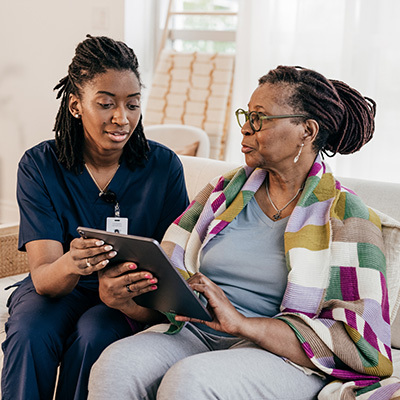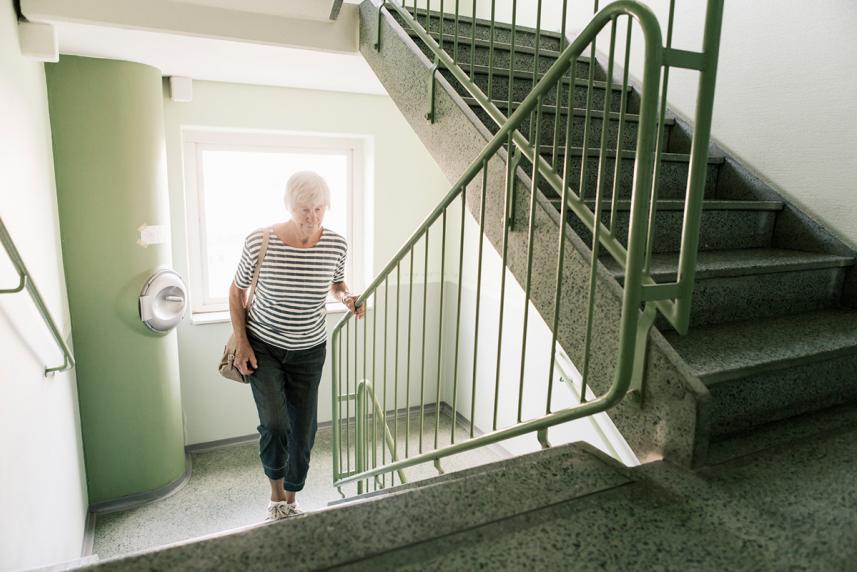
Aetna® care teams can help you find a doctor, schedule appointments, manage a condition, access the right benefits and more. It’s a personal benefit designed for Aetna Dual Eligible Special Needs Plan members.
Use these 8 simple and low-cost strategies to stay safe

Your home should be your safe space. But unfortunately, serious injuries and deaths happen at home all the time. The most common cause of injury at home is falls. More than 14 million, or 1 in 4, adults aged 65 or older report falling every year, according to the Centers for Disease Control and Prevention.* Falls also account for up to 25 percent of home deaths, according to the National Safety Council.*
Here’s what you need to know to prevent falls and keep yourself and your loved ones safe.
Falls are the leading cause of injury in adults aged 65 and older.* Falls lead to more emergency room visits and deaths than they should. Here are some ways you can prevent them at home:
Remove throw rugs that are prone to slipping and keep your floor clear of clutter to remove tripping hazards, advises Nathan Kadlecek, PT, a physical therapist at Natividad Medical Center in Salinas, California. If you have a dog, now is the time to teach them to not walk in front of you, or behind you, which can cause you to trip, he adds.
One of the highest fall risk areas is the bathroom, especially the shower or bathtub, says Stella Bard, MD, a rheumatologist in McKinney, Texas. She recommends that you install grab bars there and have a non-skid rubber mat in the shower or tub with suction cups. It’s also a good idea to use a shower chair that has a back and rubber, non-skid tips on its legs, as well as a handheld showerhead. These can all reduce the risk that you take a tumble in the tub.
This type of device allows you to pick things up off the floor or low down without bending or reaching, which raises risk of falls, says Bard. You can find one at medical or rehabilitation and wellness stores. Try not to hang things or put them in places where you have to use a stepladder to get to them.
Make sure there is good lighting everywhere, including at the top and bottom of stairs and at the ends of long halls. The National Institute on Aging recommends that you use motion-activated lights that plug into electrical outlets and automatically turn on when you walk past them.*
It’s important to wear stable footwear even when you’re in the comfort of your own home, says Bard. Wear rubber-soled, low-heeled shoes inside. Don’t walk around in socks, or in slippers with smooth soles.

Aetna® care teams can help you find a doctor, schedule appointments, manage a condition, access the right benefits and more. It’s a personal benefit designed for Aetna Dual Eligible Special Needs Plan members.
You can add colored tape to the edges of each step so that you can see them better. Make sure the tape is on the top and over the edge of each step.
Even small changes in sight and hearing raise the risk of falls, according to the National Institute of Health. Research suggests that even mild hearing loss can triple your risk of a fall. The theory is that since your brain must work harder to hear, it makes it more difficult for you to keep your balance.* Get both your vision and hearing checked, and, if you need glasses or hearing aids, be sure to wear them.
Basic strength training moves, such as squats and lunges, are helpful because they can keep your lower body strong and improve balance. Both of which reduce risk of falls, says Kadlecek. Also work on building your balance with exercises like standing on one leg.
If you are eligible for both Medicare and Medicaid, you may be eligible for an Aetna® Dual Eligible Special Needs Plan (D-SNP).
If you're 65 or older and have an eligible chronic condition, you may qualify for an Aetna® Chronic Condition Special Needs Plan (C-SNP). CSNPs are currently available in select counties within IL and PA.
You may be eligible for an Institutional Special Needs Plan if you’ve lived (or plan to live) in a participating facility for 90+ days and you have Medicare Part A (hospital insurance) and Part B (medical insurance).
*FOR STATISTICS ON FALLS SOURCE: Centers for Disease Control and Prevention. Older adult fall data. Last reviewed May 9, 2024. Accessed September 9, 2024.
*FOR STATISTICS ON DEATHS FROM FALLS: National Safety Council. Home and community overview. Accessed September 8, 2024.
*FOR RECOMMENDATIONS ON MOTION-TRIGGERED LIGHTS SOURCE: National Institute on Aging. Preventing Falls at Home: Room by Room. Last reviewed September 12, 2022. Accessed September 8, 2024.
*FOR THE RELATIONSHIP BETWEEN HEARING AND FALLS SOURCE: National Institute on Aging. Hearing loss: a common problem for older adults. Last reviewed January 9, 2023. Accessed September 8, 2024.
Aetna Medicare is a HMO, PPO plan with a Medicare contract. Our DSNPs also have contracts with state Medicaid programs. Enrollment in our plans depends on contract renewal.
The benefits mentioned are part of special supplemental program for the chronically ill. Eligibility is determined by whether you have a chronic condition associated with this benefit. Standards may vary for each benefit. Conditions include Hypertension, Hyperlipidemia, Diabetes, Cardiovascular Disorders, Cancer. Other eligible conditions may apply. Contact us to confirm your eligibility for these benefits. If you have questions, call us at 1-833-228-1297 (TTY: 711) 7 days a week, 8 AM to 8 PM.
Eligibility for the Model Benefit or Reward and Incentive (RI) Programs under the Value-Based Insurance Design (VBID) Model is not assured and will be determined by Aetna after enrollment, based on relevant criteria (e.g., clinical diagnoses, eligibility criteria, participation in a disease state management program).
Plan features and availability may vary by service area. Participating health care providers are independent contractors and are neither agents nor employees of Aetna. The availability of any particular provider cannot be guaranteed, and provider network composition is subject to change.
For mail-order, you can get prescription drugs shipped to your home through the network mail-order delivery program. Typically, mail-order drugs arrive within 14 days. You can call the phone number on your member ID card if you do not receive your mail-order drugs within this timeframe. Members may have the option to sign-up for automated mail-order delivery.
To send a complaint to Aetna, call the plan or the number on your member ID card. To send a complaint to Medicare, call 1-800-MEDICARE (TTY users should call 1-877-486-2048), 24 hours a day/7 days a week. If your complaint involves a broker or agent, be sure to include the name of the person when filing your grievance.
For accommodation of persons with special needs at meetings, call 1-833-278-3924 (TTY: 711).
Nondiscrimination Notice | CA-Specific Nondiscrimination Notice
©2025 Aetna Inc.
Y0001_3721052_2025_M
3283500-05-01
Call us at 1-833-228-1297 (TTY: 711) between 8 AM and 8 PM, Monday through Friday. Or visit AetnaMedicare.com/YourDSNP anytime.